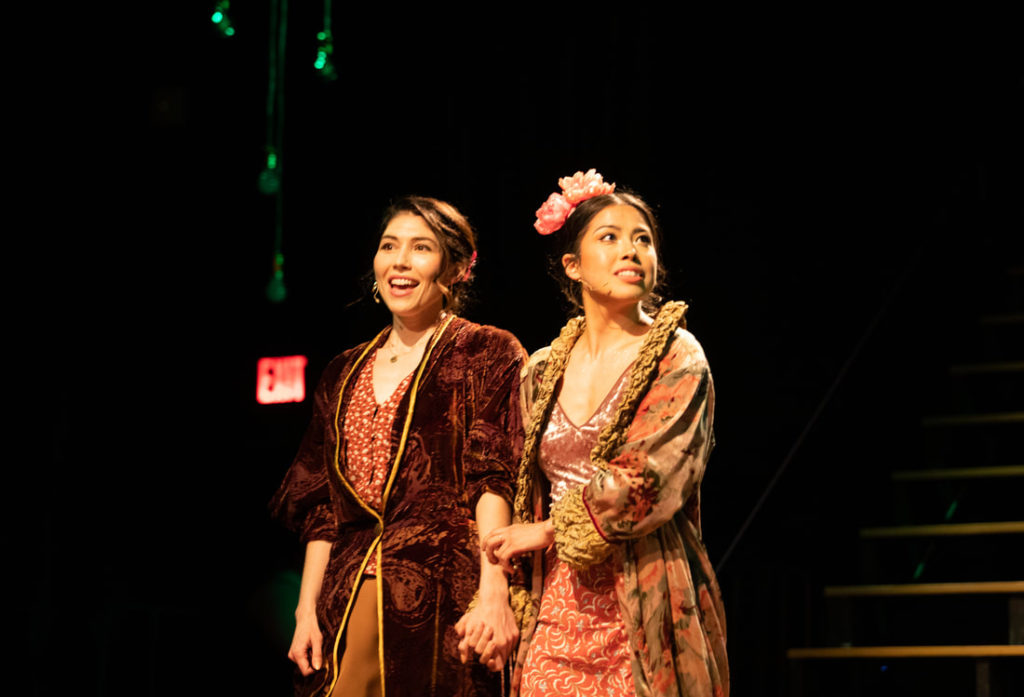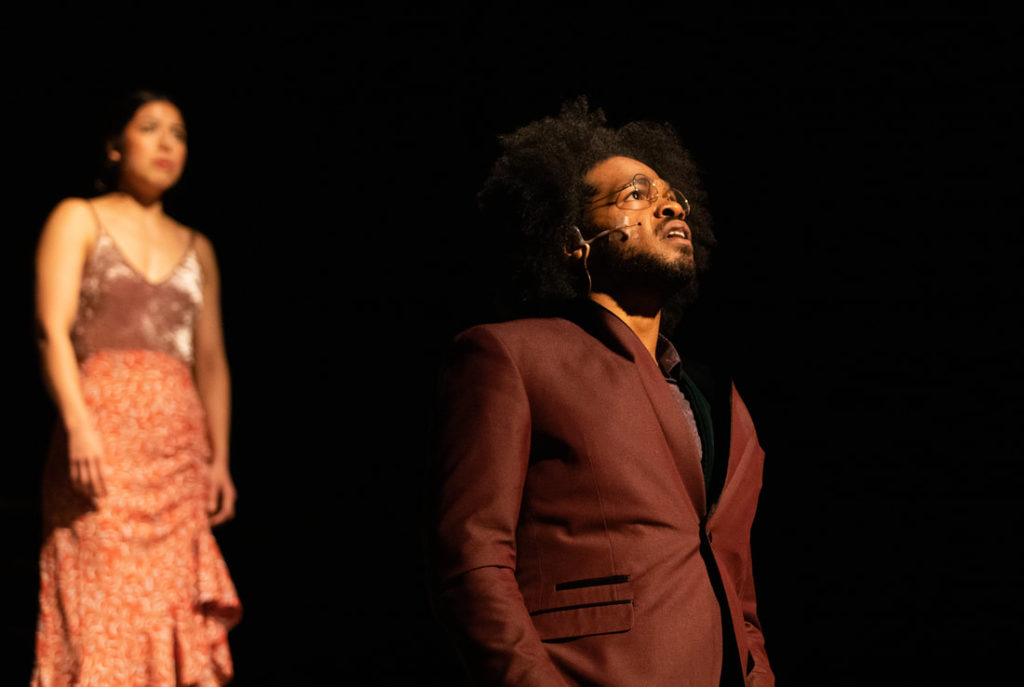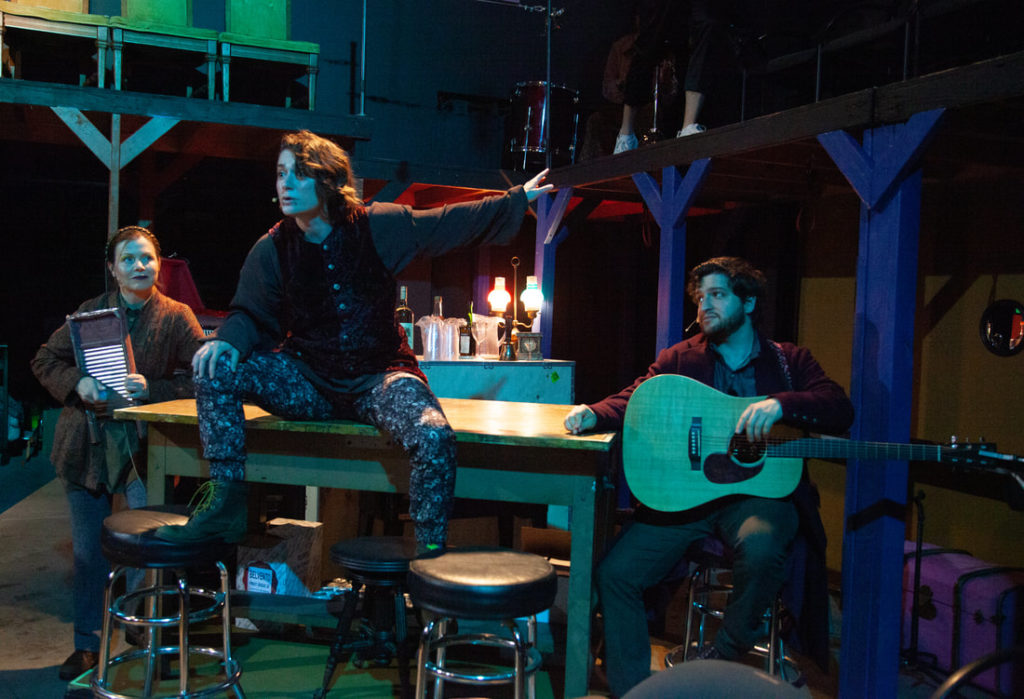
Madeleine Barker and Kayla Shimizu in NATASHA, PIERRE & THE GREAT COMET OF 1812 at Wilbury Theatre Group; photo by Erin X. Smithers.
Presented by Wilbury Theatre Group
Book, music, and lyrics by Dave Malloy
Directed by Josh Short
Costume design by Meg Donnelly
Sound and lighting design by Andy Russ
Scenic Design by Keri King, Max Ponticelli, and Monica Shinn
Intimacy Direction by Susie Schutt
Music Supervision by Milly Massey
Choreography by Ali Kenner Brodsky
May 26 – June 19, 2022
WaterFire Arts Center
4 Valley Street, Providence RI
Tickets
Review by Maegan Bergeron-Clearwood
PROVIDENCE, RI — I woke up this morning to an aching neck and shoulders: a theater hangover. Last night, for two hours straight, I perched on the literal edge of my seat, craning and twisting in all directions, soaking in all there was to see and hear. This morning, I’m reminded, for the first time in well over two years, of how it physically feels to experience a story unfold, not at me, but with me.
To the creative team behind Natasha, Pierre & the Great Comet of 1812 at the Wilbury Theatre Group: thank you for creating something worth straining for.
Dave Malloy’s adaptation of Leo Tolstoy’s War and Peace (one slice of the novel, anyway) famously spins the grandiosity of Russian literature into something tangible, energetic, and immediate. I’ve been an avid listener of the original cast recording since its 2016 Broadway run, enraptured by the score’s eclectic interweaving of operatic vocals, classical folk sounds, and electropop funk. But, to see these elements burst into life with careful guidance by director Josh Short and an utterly acrobatic design team – the words and sounds of a soundtrack I know nearly by heart all-at-once mattered.

Kayla Shimizu and Rodney Witherspoon II; photo by Erin X. Smithers.
The intricate social dynamics and opalescent trappings of 19th century Russia melt away with this production’s bare-bones staging, designed by Keri King, Max Ponticelli, and Monica Shinn. A galley stage, framed by two staircases, provides for endless character configurations and scenic reveals. There is not a gilded portrait or velvet curtain to be found, but the heightened social stakes of this world are made effortlessly evident as characters gaze down from the balcony, pop out of the band with accordions and guitars, and trail each other up and down the stairs.
The pacing is refreshingly restrained for a musical: scenes breathe when they need to breathe and are breathless when they need to be breathless.
Meg Donnelly’s costumes are also deceptively simple: an unlikely assortment of boots and vests and flowing skirts that feel like they’re part of the same world. They also sparkle: combined with Andy Russ’ lighting design, costumes capture the light and highlight bodies in beautiful stage pictures.
All of these delicate stage components make space for the ensemble of performers to quite simply excel.
Great Comet is about the dizzying highs and lows of human existence, as is befitting for an adaptation of classic Russian literature. The titular Natasha, played by starry-eyed Kayla Shimizu, embodies the passionate heights of youthful desire; her titular counterpart, Pierre, played by Rodney Witherspoon, embodies the depths of existential despair; and the ensemble characters give voice to the peaks and valleys within this emotional landscape.
To name some standouts: Anna Slate and Gunnar Manchester as the pleasure-seeking Helene and Anatole; Madeline Barker as tender-hearted Sonya; Anna Basile as the braggadocious Dolokhov (a part usually played by a cis-male actor); and Teddy Lytle as Balaga, the unhinged one-scene-wonder troika driver.
But it’s Witherspoon who showcases why this specific production of this specific musical matters. Bookish and restrained, with spectacles on his nose and his textured hair pulled into a tight bun, Pierre begins the production as a picture of restraint – and then, Act One ends with the “Dust and Ashes,” a ballad of existential despair, and everything changes.

Cast of NATASHA, PIERRE & THE GREAT COMET OF 1812; photo by Erin X. Smithers.
With stunning technical control, Witherspoon’s singing is simultaneously sure-footed and tender. As he descends, slowly and carefully, from the balcony to stage, his voice carries the audience from one hopeless beat to the next: “Is this how I die?” he wonders, again and again – but then the song shifts. He lets loose his hair. He strides center stage. He belts. The ensemble joins along, lifting him higher and higher: “I want to wake up!” he declares. It’s a moment of release, a relinquishment of all the constraints that 19th century Russia has buried him beneath.
Act Two begins, and societal pressures press down upon Pierre once again – but Witherspoon keeps his natural hair loose, and he is buoyed by a glorious sense of freedom-within-constraints through the rest of the act.

Jennifer Mischley, Anna Basile, and Ian Doran; photo by Erin X. Smithers.
This feeling of release comes through in so many other lovely moments: in the queer subtext between Sonya and Natasha; in the gender-expansive casting of Dolokhov; in the raucous clubbing scenes; in so many characters’ passionate, if ill-advised, pursuits of pleasure. The world that these people inhabit is stifling, but joy spills out between the cracks.
This production of Great Comet feels like one big exhale.
Like so many these days, I too often find myself stuck in the mires of Pierre’s existential angst, longing for the highs of Natasha’s lust for life. But seeing this production of Great Comet reminded me that it’s worth pushing through life’s “Dust and Ashes” low points. It reminded me that the highs still exist. It reminded me to breathe.
